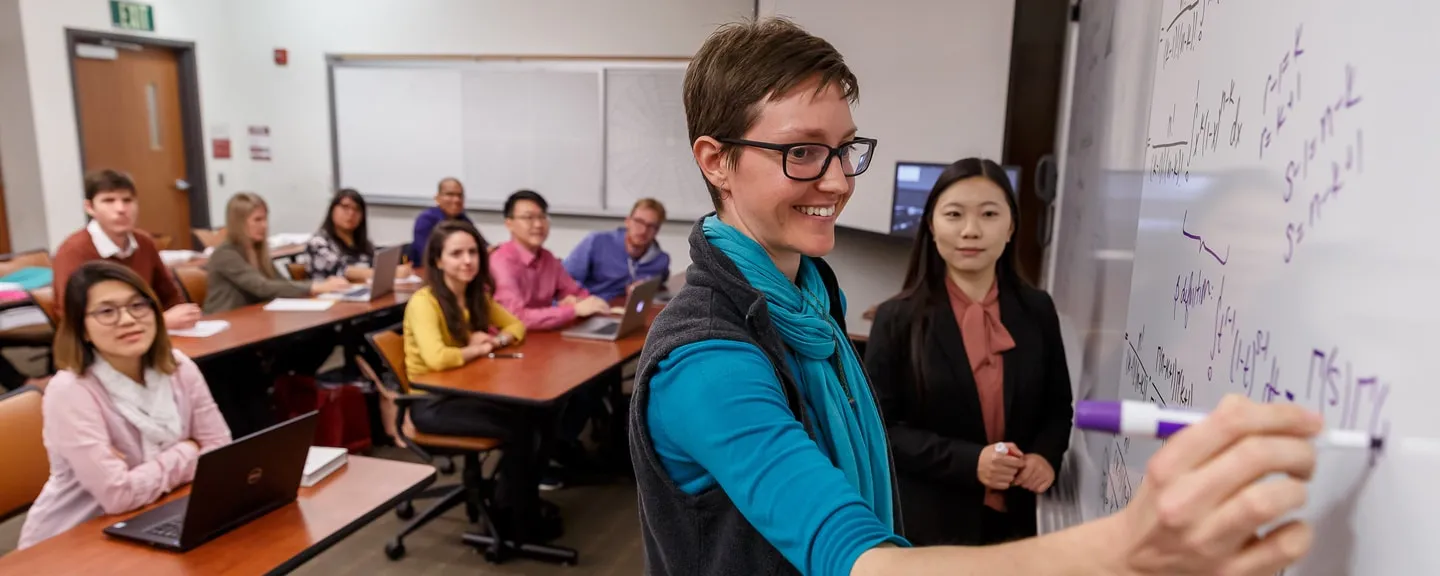- Home
- >
- APU Articles
- >
- News Article
With a Diverse College Faculty, All Students Gain New Perspectives
September 24, 2019 | Written By Stephanie Thurrott

All students benefit when they are taught by a diverse college faculty. Keith Hall, EdD, vice president and chief diversity officer at Azusa Pacific University, stressed that it’s important for students to experience social and cultural engagement that facilitates their thriving and success. At APU, this is expressed through the distinctive framework of “Being. Becoming. Belonging.” These dimensions highlight the value of:
Being: Understanding one’s God-given capacity and identity
Becoming: Becoming interculturally competent to effectively engage those who are different
Belonging: Cultivating a strong of sense of community that translates to holistic collegiate success
Students of color can forge this connection with faculty members who look like them and serve as role models, as well as professors who intentionally employ culturally responsive approaches in their teaching. Additionally, it’s important for all students to be exposed to and glean insights from different perspectives and other cultures.
Richard S. Martinez, EdD, executive director of the Center for Diversity, Equity, and Inclusive Excellence at APU, shared his own experience as a student of color. Growing up in the Inland Empire in the Rancho Cucamonga area, he wasn’t exposed to a Latino educator until he was in community college.
“I can still remember his name—Diego Vigil—he taught Chicano studies,” Martinez said. “I was enthralled, impressed, and motivated as a Latino male to have him as a role model. Up to that point, I didn’t know that it was even possible for someone who looked like me to be in an influential educator role. Modeling makes a difference. That was a turning point for me as a student.”
A Diverse Education Can Benefit All Students
All students can benefit from a diverse learning environment and an education that exposes them to different perspectives. A focus on diversity is a key part of APU’s Christian identity.
“It is our moral imperative as Christian educators to cultivate an organizational climate that openly values diversity as an asset, not a deficit,” Martinez said. “Diversity is not divisive. The diversity of our world was created by God. With that in mind as educators, we need to cultivate diverse perspectives in the classroom.”
A diverse education also prepares students for careers in the diverse world, Martinez added. “As Christian educators, teaching discernment and the local and global perspectives of the human experience becomes a vital element to equipping our students for life in a ‘glocal’ environment,” he said.
Working to Better Mirror the Community
The Azusa Pacific University community has long endeavored to reflect the community at large. While Martinez noted that the university has already made many strides toward this goal, he acknowledged that the university needs to continue to build a more diverse college faculty. “Various surveys and studies continue to show that our faculty and staff demographics do not reflect the community composition of Azusa and Southern California,” he said.
The Center for Diversity, Equity, and Inclusive Excellence at APU endeavors to change this. In addition to providing support to faculty and staff, the center fosters the development and facilitation of diversity initiatives—all in the pursuit of inclusive excellence. Through its initiatives, the center aims to advance social justice on campus by increasing access, opportunity, equity, diversity, and inclusivity in all aspects of university life.
Building a Diverse Team of Leaders
Growing a diverse group of educators necessitates a focus on full-time faculty. Laurie Schreiner, PhD, chair and professor of APU’s Department of Higher Education, conducted a student success analysis for Azusa Pacific. She noted in her research that, in the past seven years, the percentage of APU adjunct and part-time faculty who are persons of color has increased, from 23.7 percent to 35.6 percent.
Schreiner pointed out that students benefit by studying with more full-time faculty of color who can commit to more student interaction. Accordingly, full-time faculty are involved in academic decision-making and curriculum reform. She noted that a campus-wide sense of community helps all students see the world through new eyes.
“Creating a sense of community on campus is the single best way to help all students thrive,” Schreiner wrote.
Are you interested in learning more about Azusa Pacific University’s focus on advancing diversity and inclusivity? Discover how the school approaches diversity from a biblical perspective.